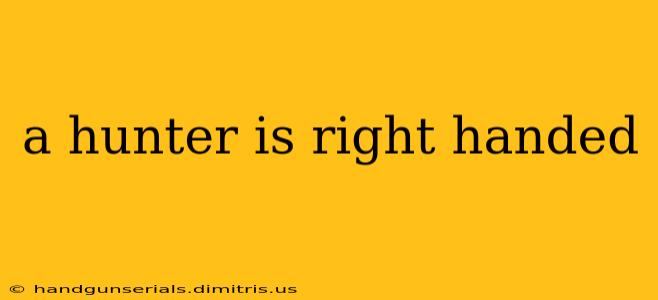The Right-Handed Hunter: Advantages, Disadvantages, and Considerations
For centuries, hunters have relied on their skills and tools to succeed. While many factors contribute to a successful hunt, handedness plays a surprisingly significant role, especially concerning weapon handling and overall fieldcraft. This post explores the advantages and disadvantages a right-handed hunter might experience, considering both traditional hunting methods and modern techniques.
Advantages of Being a Right-Handed Hunter
The overwhelming majority of hunting equipment—rifles, shotguns, bows, and even many knives—is designed for right-handed users. This inherent design advantage translates into several key benefits:
-
Improved Weapon Handling: Right-handed hunters naturally find a more comfortable and intuitive grip on right-handed firearms and archery equipment. This enhanced comfort leads to better accuracy, quicker target acquisition, and ultimately, a higher probability of a clean shot. The natural positioning of the dominant hand facilitates smoother recoil management, especially crucial during rapid firing or when dealing with larger calibers.
-
Enhanced Fieldcraft: Many hunting tasks, beyond simply aiming a weapon, benefit from right-handed dexterity. Tasks like navigating terrain with a map and compass, preparing equipment, and using tools are often executed more efficiently with the dominant hand. This frees up the non-dominant hand to support other actions, such as steadying oneself or holding a light.
-
Accessibility and Availability: The vast majority of hunting gear and training resources cater to right-handed individuals. Finding properly fitted equipment, accessing relevant instructional materials, and receiving effective guidance from experienced hunters are considerably easier for right-handed hunters.
Disadvantages of Being a Right-Handed Hunter
While being right-handed offers undeniable advantages, certain challenges exist:
-
Potential Blind Spots: Depending on hunting conditions and the type of firearm used, a right-handed hunter might experience slight blind spots when shouldering a weapon. This is especially true in dense cover or when dealing with unexpected movement to the left. Awareness and proper shooting techniques are essential to mitigate this.
-
Challenges in Specific Hunting Situations: Certain hunting situations, such as navigating tight spaces or shooting from awkward positions, can present unique difficulties. Adaptability and the ability to adjust shooting techniques are critical in overcoming such challenges.
-
Equipment Limitations in Certain Situations: While most equipment is designed for right-handed users, specific situations might necessitate using left-handed equipment. In such cases, adaptation or finding suitable alternatives might be crucial.
Considerations for Right-Handed Hunters
Regardless of handedness, successful hunting hinges on several crucial factors:
-
Proper Training and Practice: Regardless of natural advantages, consistent training and practice are essential for developing precision, accuracy, and safe handling techniques.
-
Understanding Ballistics and Weapon Handling: A deep understanding of ballistics, trajectory, and weapon mechanics is crucial for safe and effective hunting.
-
Adaptability and Situational Awareness: The ability to adapt to varied terrain, weather conditions, and unexpected circumstances is paramount to successful and safe hunting.
In conclusion, being right-handed provides significant advantages for hunters, especially concerning weapon handling and equipment accessibility. However, understanding and mitigating potential disadvantages, coupled with consistent training and situational awareness, are crucial for achieving safe and successful hunts. Ultimately, successful hunting transcends handedness and relies on a combination of skill, preparation, and respect for both the game and the environment.

